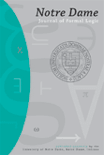
Notre Dame Journal of Formal Logic
Scope & Guideline
Exploring the Intersection of Mathematics and Philosophy
Introduction
Aims and Scopes
- Formal Logical Systems:
The journal explores various formal logical systems, including modal logic, predicate logic, and many-valued logics, contributing to the understanding of their structures and applications. - Mathematical Foundations:
There is a strong emphasis on the mathematical underpinnings of logic, including set theory, model theory, and algebraic structures, which are frequently examined in depth. - Philosophical Implications:
The intersection of logic with philosophy is a recurrent theme, where philosophical questions about truth, belief, and semantics are rigorously analyzed. - Applications of Logic:
The journal publishes research that applies formal logic to various fields, including computer science, cognitive science, and mathematics, showcasing the relevance of logical frameworks. - Research on Logic and Computability:
Topics related to computability, including proof theory and the effectiveness of logical systems, are significant areas of interest, reflecting the journal's commitment to foundational studies.
Trending and Emerging
- Advanced Modal Logic:
There is an increasing focus on advanced topics in modal logic, including modal model theory and specific applications of modal frameworks in diverse contexts, indicating a growing interest in the complexity of modal systems. - Computational Aspects of Logic:
Research that bridges logic and computation, particularly in areas like proof complexity and computability theory, is becoming more prominent, showcasing the relevance of logical foundations in computer science. - Non-Classical Logics:
The exploration of non-classical logics, including paraconsistent and relevance logics, is on the rise, reflecting an expanding interest in alternatives to traditional logical frameworks. - Interdisciplinary Applications:
Papers that apply formal logic to interdisciplinary fields such as cognitive science, linguistics, and artificial intelligence are increasingly common, emphasizing the practical implications of logical theory. - Philosophical Logic:
There is a notable increase in research addressing philosophical aspects of logic, particularly concerning belief, truth, and semantics, which aligns with broader philosophical inquiries in contemporary thought.
Declining or Waning
- Classical Logic:
There has been a noticeable decrease in publications specifically focused on classical logic, as researchers increasingly explore non-classical logics such as modal and intuitionistic logics. - Historical Analyses of Logic:
Papers that delve into historical perspectives or analyses of classical logicians (e.g., Aristotle, Frege) appear to be less frequent, indicating a potential waning interest in historical studies within the journal. - Elementary Set Theory:
Research directly addressing elementary or foundational aspects of set theory seems to be declining, suggesting a shift towards more complex and nuanced topics in set-theoretic studies. - Standard Proof Techniques:
Traditional proof techniques, such as those relying heavily on sequent calculus or natural deduction without novel twists, are less prevalent in recent issues, indicating a move towards more innovative approaches. - Basic Modal Logic:
Basic explorations of modal logic, particularly those that do not engage with advanced applications or theoretical developments, appear to be less common, as the focus shifts to more sophisticated modal frameworks.
Similar Journals

ERKENNTNIS
Pioneering rigorous discourse in philosophy and logic.ERKENNTNIS, published by SPRINGER, is a premier academic journal that has been advancing the study of philosophy and logic since its inception in 1919. With its esteemed ranking in the Q1 quartile for both categories as of 2023, it stands at the forefront of scholarly discourse, earning an impressive rank of #104 in the field of philosophy and #13 in logic according to the Scopus rankings. This influential publication not only contributes to the theoretical underpinnings of these disciplines but also fosters a vibrant exchange of ideas among researchers, professionals, and students alike. While it does not offer open access to its articles, the journal's esteemed reputation and rigorous peer-review process ensure that all published works maintain the highest standards of quality and intellectual inquiry, making ERKENNTNIS an essential resource for anyone engaged in these critical areas of study.

Studia Logica
Exploring the Foundations of Logic and PhilosophyStudia Logica is a leading international journal published by Springer that focuses on the intricate interconnections between logic, philosophy, and the history of science. Established in 1953, this journal has garnered an esteemed reputation, consistently appearing in the Q1 category for History and Philosophy of Science and Q2 for Logic in 2023. With a robust Scopus ranking, where it stands at #42 out of 223 in the field of Arts and Humanities and #17 out of 41 in Mathematics (Logic), Studia Logica is pivotal for researchers and scholars keen on exploring the foundations and implications of logical theory and its applications. The journal does not follow an open access model, ensuring that the published work maintains a high standard of quality and rigor. Located in Dordrecht, Netherlands, the journal continues to be a crucial conduit for advancing scholarly discourse and disseminating cutting-edge research in its respective fields.
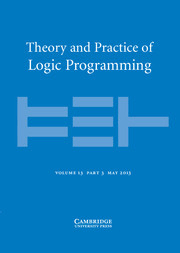
THEORY AND PRACTICE OF LOGIC PROGRAMMING
Pioneering Insights in Artificial Intelligence and Software Development.THEORY AND PRACTICE OF LOGIC PROGRAMMING, published by Cambridge University Press, is a premier academic journal that delves into the evolving field of logic programming, offering insights and advancements from 2001 to 2024. With an ISSN of 1471-0684 and an E-ISSN of 1475-3081, this journal serves as a vital resource for researchers, professionals, and students interested in areas such as artificial intelligence, computational theory, and software development. In 2023, the journal was recognized for its excellence, achieving Q1 status in Computational Theory and Mathematics and Q2 in several other categories, underscoring its significant impact within the academic community. Despite not being open access, its robust content, curated by esteemed scholars, guarantees high-quality research and innovative methodologies that are crucial for advancing the field. The journal's rigorous peer-review process and its standings in Scopus rankings further emphasize its relevance and authority, making it a quintessential platform for disseminating key findings and fostering scholarly dialogue.

Journal of Logic Language and Information
Exploring the Nexus of Logic, Language, and InformationThe Journal of Logic Language and Information, published by SPRINGER, stands as a leading interdisciplinary platform dedicated to the exploration of the interconnections between logic, language, and information theory. With a history spanning from 1992 to 2024, this esteemed journal provides a vital forum for researchers, professionals, and students in fields such as Computer Science, Linguistics, and Philosophy. Notably recognized in the 2023 rankings, it holds a Q2 quartile in Computer Science (miscellaneous) and Q1 quartiles in both Linguistics and Language, and Philosophy, reflecting its high academic quality and relevance. Despite its nuanced focus, the journal's diverse scope attracts a global readership, encouraging innovative research and critical discourse. Although it is not an Open Access publication, the Journal's valuable contributions can be accessed through various institutional subscriptions, ensuring that its scholarly output remains influential within the academic community.
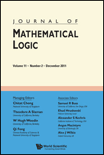
Journal of Mathematical Logic
Innovating the Future of Mathematical LogicJournal of Mathematical Logic, published by World Scientific Publishing Co Pte Ltd, stands as a premier platform for the dissemination of cutting-edge research in the field of logic, with a notable Q1 ranking in the category of Logic for 2023. Catering to an international audience of researchers, professionals, and students, this journal serves as a vital resource for the latest advancements and theoretical developments in mathematical logic. Spanning from 2007 to 2024, the journal emphasizes contributions that explore both foundational and applied aspects of logic, thereby appealing to a diverse readership. Although currently subscribed access only, the journal’s rigorous peer-review process ensures high-quality publications that enrich the academic discourse within the mathematical community. With its strategic location in Singapore, the Journal of Mathematical Logic not only contributes to the global conversation in mathematics but also fosters collaboration among scholars from various backgrounds.
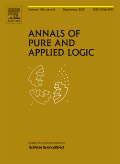
ANNALS OF PURE AND APPLIED LOGIC
Advancing Knowledge in Pure and Applied LogicANNALS OF PURE AND APPLIED LOGIC is a premier academic journal published by Elsevier, specializing in the foundational aspects of logic since its inception in 1974. With a strong commitment to disseminating original research, the journal focuses on both pure and applied logic, making significant contributions to the fields of mathematics and computer science. The journal is recognized for its rigorous peer-review process and is currently ranked Q1 in Logic, reflecting its status among the top-tier publications in the discipline. Researchers will find valuable insights and advancements in logical theory and practice in its pages, while the journal's Scopus ranking further positions it strategically within the mathematical logic community. Although it is not an open-access publication, it offers convenient access options for institutions and subscribers, ensuring a wide reach for groundbreaking findings. The ANNALS OF PURE AND APPLIED LOGIC continues to be an essential resource for professionals, students, and academics alike, facilitating a deeper understanding of logical frameworks and their applications.

Logical Methods in Computer Science
Championing open access to pioneering logical research.Logical Methods in Computer Science is a premier Open Access journal dedicated to fostering scholarly dialogue within the realms of Computer Science and Theoretical Computer Science. Established in 2004 and published by LOGICAL METHODS COMPUTER SCIENCE E V in Germany, this journal aims to bridge theoretical frameworks and practical applications, providing a platform for innovative research and discoveries. With an impressive HIndex reflecting its commitment to high-quality research, Logical Methods in Computer Science has achieved a Q2 ranking in both the miscellaneous and theoretical categories of computer science, indicating its growing influence in the academic community. Researchers, professionals, and students are encouraged to access and engage with the wealth of knowledge this journal offers, which is freely accessible to facilitate widespread dissemination of cutting-edge advancements in logical methods. With its convergence period extending from 2005 to 2024, Logical Methods in Computer Science continues to be a vital resource for those looking to explore the intersections of logic, computation, and mathematics.

Logic and Logical Philosophy
Cultivating Insight in Logical Philosophical ResearchLogic and Logical Philosophy is a distinguished journal published by Nicolaus Copernicus University Torun, Poland. With its ISSN 1425-3305 and E-ISSN 2300-9802, the journal has established itself as a premier outlet for cutting-edge research in the field of philosophy, specifically focusing on the intricate intersections of logic and philosophical inquiry. Since its inception, the journal has consistently demonstrated its impact within the academic community, achieving a commendable Q1 ranking in the 2023 Arts and Humanities category, placing it in the 73rd percentile of publications in the field. The journal aims to foster scholarly dialogue and contribute significantly to the advancement of philosophical understanding through rigorous research articles, critical reviews, and discussions. With a commitment to high academic standards and accessibility—though specific access options may vary—Logic and Logical Philosophy remains an essential resource for researchers, professionals, and students alike, paving the way for innovative philosophical discourse until 2024 and beyond.

Scientific Annals of Computer Science
Advancing Knowledge in Computer Science and Applied MathematicsScientific Annals of Computer Science, published by Alexandru Ioan Cuza University of Iasi, Romania, is an esteemed open access journal that has been disseminating knowledge since 2007. With the ISSN 1843-8121 and a focus on the fields of applied mathematics and computer science, this journal supports researchers and practitioners by providing a platform for innovative ideas and substantial advancements in computational methodologies. Despite its current Q4 ranking in both Applied Mathematics and General Computer Science categories, the journal is dedicated to expanding the horizons of scientific inquiry through the convergence of theoretical and practical perspectives. Covering research from 2009 to 2024, the journal aims to elevate scholarly communication and ensure accessibility by presenting its articles free of charge, inviting contributions that can shape the future of technology and mathematics. By embracing an open access model, Scientific Annals of Computer Science aligns with the global movement towards making scientific knowledge universally accessible, thereby fostering collaboration and knowledge-sharing among researchers, professionals, and students alike.
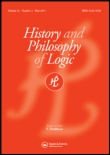
HISTORY AND PHILOSOPHY OF LOGIC
Charting the Philosophical Evolution of LogicHISTORY AND PHILOSOPHY OF LOGIC is a prestigious journal published by Taylor & Francis Ltd, focusing on the intricate relationships between historical contexts and philosophical inquiries within the realm of logic. With its ISSN 0144-5340 and E-ISSN 1464-5149, the journal has established itself as a vital academic resource since its inception in 1980 and will continue to contribute to the field until 2024. It holds an impressive status, ranking in the Q1 category in History and Q2 in History and Philosophy of Science according to the 2023 category quartiles. This journal is recognized for its high-impact research, achieving notable positions in Scopus ranks, including 80th percentile in Arts and Humanities - History and 58th percentile in History and Philosophy of Science. Although it does not offer open access, it remains a crucial platform for scholars, researchers, and students aiming to explore and advance knowledge at the intersection of logic's history and its philosophical implications.